Nearly everything that is "right" about our Provincial Parks is overshadowed by what can go wrong...
In light of what we now know about climate change and the human activities which can affect it, I believe the Manitoba Government should and can play a larger leadership role in both educating the public and in signaling our resolve to change behavior.
One department that one would hope would lead the way is Conservation and Climate, and one place where we should hope to best practices is in our Provincial Parks. As in all departments, there is a lot of talk about sustainability.
But like many environmental policy initiatives at all levels of government, and by governments of all stripes, the environmental features touted here seem more like a public relations exercises than serious attempts to address the real issues of sustainability. Real change will have to push us at least a little ways out of our comfort zone, and our governments are very reluctant to challenge voters.
As a frequent visitor to our many parks I have observed that some seem to be managed with a lack of sensitivity to environmental concerns. This is apparent in both small day-to-day management decisions and in some general policies.
The staff whom we encountered were friendly and pleasant, and in most ways were doing a fine job - but they perhaps needed some leadership and guidelines.
First and foremost, all the parks I have visited continue to enable our car-dependent culture in both subtle and obvious ways. At some campgrounds the most desirable sites, the ones close to the beach, are serviced sites. On these serviced sites one often finds large motor homes or trailers pulled by large trucks. It is obvious that many are long-term.
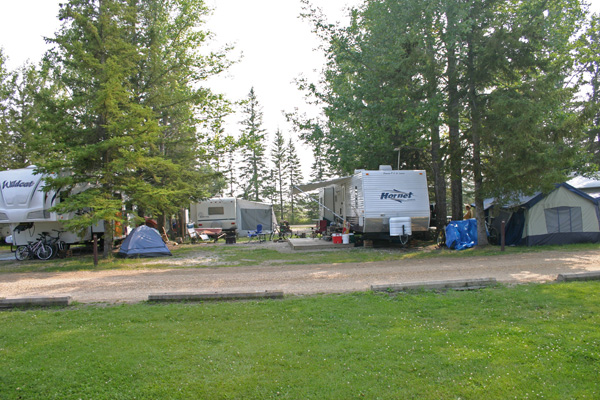
By contrast, we come in with our small car and a tent. If we can get an unserviced site we sometimes save a few dollars. The energy/environmental footprint differential and the simple stress level on the infrastructure are both obvious and substantial. It seems as if the environmentally friendly camper is actually subsidizing the energy hog.
While beautiful and well managed, it begs several interesting questions.
Apparently we have spent 8 million or so creating a sustainable, energy efficient, eco-friendly place for Manitobans and visitors to spend some time while enjoying Lake Winnipeg.
So what does and ecologically friendly campground look like?
Yes, the washroom lights and water heating are solar powered and they tell me ecologically friendly materials were used throughout. But what about the row after row of carefully manicured and tended sites, featuring carefully leveled graveled pads connected by paved lanes?
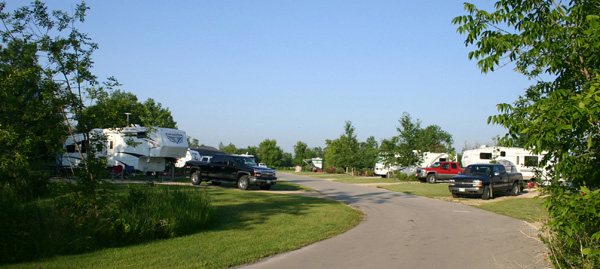
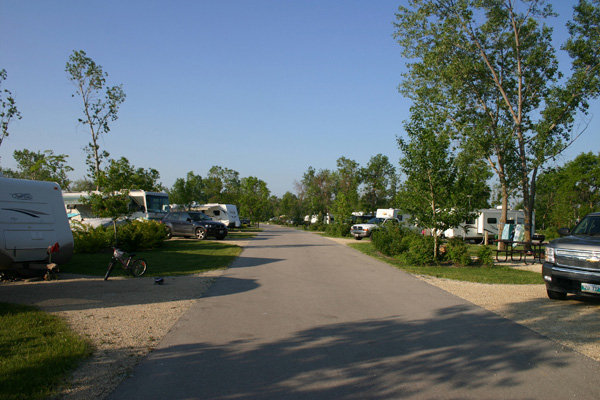
The sites are fully serviced with no provisions made for those of us who prefer a more low-impact experience. Why do those who simply want a quiet evening by the lake seem almost unwelcome?
I understand why it must have seemed easier to install all services in each site - but again, while we didn't require those services, we still paid the same rate. The rate wasn't that bad - so I didn't think too much about it. On my recent trip to Ontario, some campground prices were much higher - so that's good? Not if I’m subsidizing this monument to waste.
The view is of countless large motor homes and fifth wheel trailers towed by large trucks, I didn't even want to think too much about the incredible wasteful fossil fuel consumption, the wear and tear on the roads, and the CO2 emissions the sight represented. It's a free country. We have the right to pollute, and conspicuous consumption is a hallmark of our station in life. However, I couldn't help wondering about what a deal it was... for them, the ones with these fully equipped homes on wheels. And I have a nagging suspicion that my provincial government, by providing them with this beautiful lakeside site at this cut-rate cost, is actually losing money on the deal. Which means that those of us who choose a less wasteful way to enjoy the outdoors are helping them out. Should it feel good to lend a hand to those more financially fortunate than myself? Is that a policy direction that supports sustainability (let alone justice?)
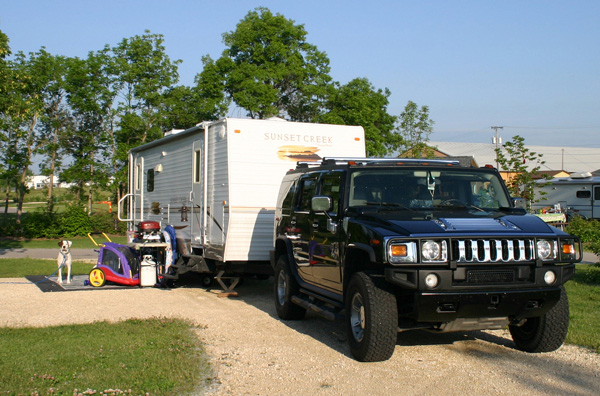
What sort of "environmentalists" were consulted before this place was constructed? No one really interested in the environment would design a campground wherein the environmentally friendly camper subsidized the those with a larger carbon footprint.
It is of course not a campground in any sense of the word, but rather a summer home park, suburbia on wheels, and by providing it, our government is encouraging (did I mentions subsidizing?) extremely wasteful and unsustainable behavior. It's sort of like a reverse carbon tax.
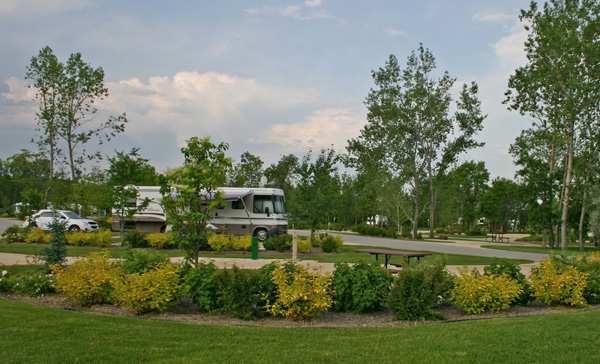
Walk around the campground on a warm day and two sounds predominate. The hum of air conditioning units and the whine of gasoline powered lawn care devices.
Sites can have as many as three vehicles, many sites have a tent as well. Many have brought in a whole variety of furniture, barbecues, etc. This isn’t camping. The point is; these users pay the same fee as us, but in terms of environmental impact and in terms of use of resources - we’re much more profitable as clients. Shouldn’t a fee structure promote non-intrusive low impact use of natural resources?
Some years ago I wrote to the Minster of the Environment outlining some of the above concerns. A staffer replied, acknowledging my concerns and helpfully reminded me that I could find unserviced spots another half hour down the road that might meet my needs. Thanks. Those of us who want to do the right thing should drive farther and take second best. It reminds me of when many restaurant non-smoking section were too small and not as well located as the smoking section. Talk about not getting it!
My observations cause me to ask if this is what we want from our provincial park campgrounds? Couldn't we leave that sort of the thing to private enterprise?
My solution is simple. In all aspects of government services we need to make sure that the incentive or advantage favours, and thus encourages, environmentally responsible behavior. All I need is a small grassy area to set up our tent - that doesn't cost much to create or maintain. Was it too much to hope for that the campground at Winnipeg Beach, evidently designed with large camping vehicles in mind, might have a small tenting-only area? And while we're at it why shouldn't the environmentally friendly camper get the nice spots for a change?
 |
 |
 |